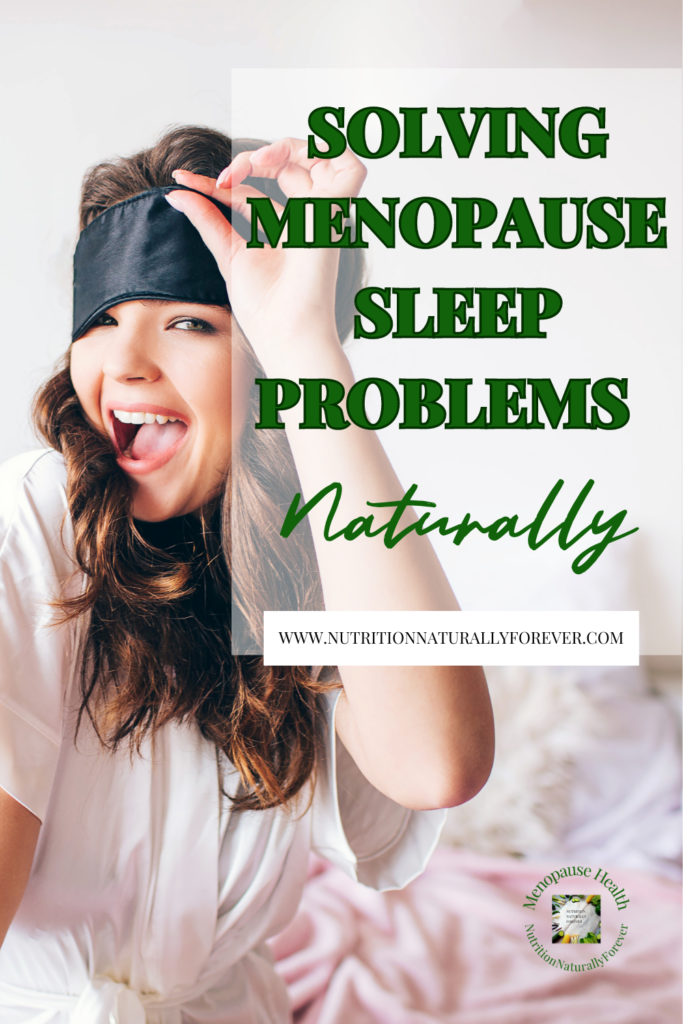
Solving menopause sleep problems naturally.
There are 34 official symptoms of menopause and sleep problems are one of them.
I don’t know about you but sleep is my goddess!
If I don’t get a good night’s sleep I lack motivation and enthusiasm for anything and this is a challenge when you are a busy working woman or running your own business, not to mention a home and family!!
Why do women start to experience sleep problems once they hit 40+?
What can you do to minimise these problems?
Read on to learn more.
What Are Menopause Sleep Problems
How do you know if you are suffering from menopause sleep problems or if it’s just a bad night’s sleep or even insomnia?
Insomnia is more likely if you have trouble sleeping for 3 or more nights in a row per week and this has been going on for a few months.
However, whether you have insomnia or troublesome sleep problems it can be extremely frustrating. Today I am going to focus on sleep problems rather than insomnia.
Your sleep problems might be any or all of the following;
- Difficulty falling asleep, for instance not dropping off within 30 minutes
- Difficulty staying asleep, you likely have less than 6 hours per night
- You wake several times during the night
- You wake early but still feel tired
- Lack of deep sleep leaves you feeling tired during the day
Experiencing sleep problems during menopause is extremely common with over 50% of menopausal women claiming to have experienced any of the above and worse.
How Much Sleep Do You Need?
We are all unique and the amount of sleep you need may differ depending on what is going on in your life, the season and the stage of your menstrual cycle.
If you no longer have your own cycle the moon cycle can give some very interesting insights into your sleep. You can read more about the moon and menopause in this post.
The magic number according to popular research is 7 hours however, quality over quantity is best.
It is important to realise that you don’t need to ‘catch up’ on lost sleep by sleeping in or going to bed early.
The best way for the body to reset is to stick to your regular routine. If you are tired you will benefit more from a short nap during the day.
Why Does Menopause Cause Sleep Problems
Hormone fluctuations during menopause are responsible for disturbed sleep, in particular, Melatonin, Estrogen and Progesterone.
These fluctuations can cause hot flushes and night sweats which disturb your sleep. You might also suffer from restless legs, aches and pains and an increased need to wee during the night.
Lifestyle plays a part too and if you are struggling with any of the sleep problems listed above then following a framework such as the one I offer in my Menopause Solution Sessions and Empowered Menopause Journey package will certainly help you to gain control and improve this area of your life.
Improve Your Sleep Today
Let me reassure you that although we are at the mercy of our hormones and genetics this too shall pass, here are my top tips for you to try today to ease your menopause sleep problems;
- Stick to a regular sleep/wake routine
- Get natural daylight as early in the day as possible to reset your circadian clock
- Keep your bedroom cool and dark
- Hydrate during the day but not too close to bedtime
- Avoid blue light later in the day or use filtering glasses
- Practice meditation or yoga daily
- Write a to-do list/brain dump before bed
- Use essential oils such as lavender or chamomile at bedtime
- Don’t go to bed hungry
- Include foods in your diet which will increase your melatonin naturally.
Melatonin is a hormone released by the pineal gland in the brain at night.
It helps the body sync to the circadian cycle, knowing when to wake and sleep.
When this hormone becomes imbalanced it can lead to sleep issues.
Lack of sleep negatively impacts other hormones in the body such as leptin and ghrelin, our hunger and satiety hormones, along with insulin.
Milk contains melatonin so it is no surprise a cup of warm milk is a traditional bedtime drink, if you can’t tolerate dairy then nuts such as pistachios and almonds help the body produce melatonin.
Other foods to include in your diet to support melatonin levels are rice, fatty fish, oats, mushrooms, goji berries, corn and bananas.
Stay Tuned
If you haven’t already received my blog posts in your inbox, subscribe by downloading any of my free resources on the Quick Links page.
I also have a Facebook community full of women ready to take control of their menopause journey through aligned food and lifestyle choices, come and join us at the Menopause Nutrition Hub.
Alternatively, book a Wild Well-Being Call and discover your path to an empowered menopause.
